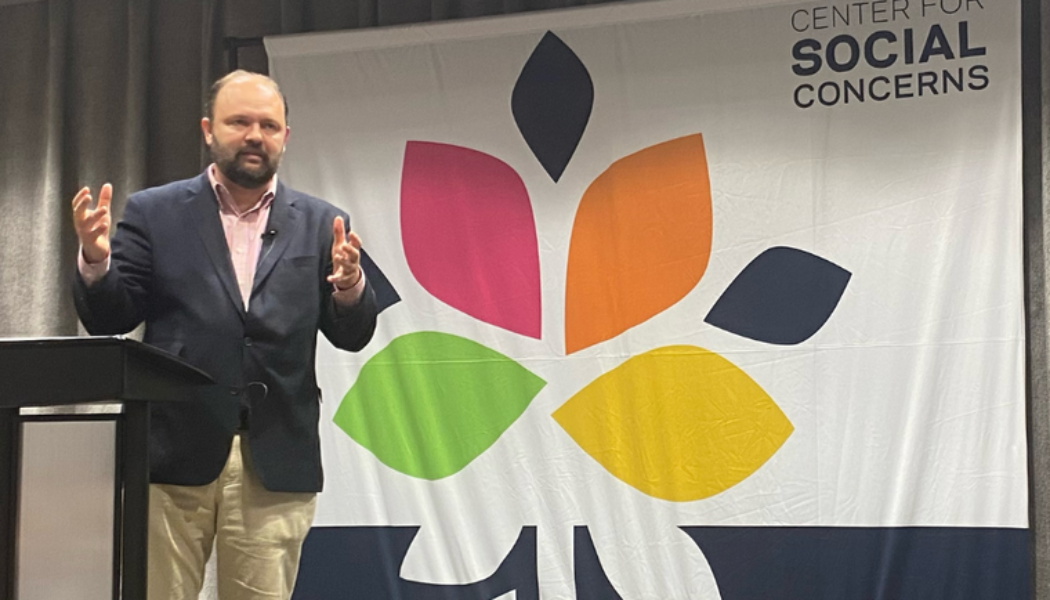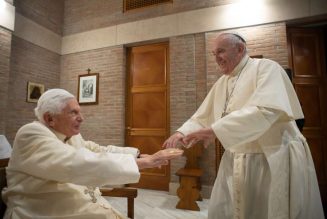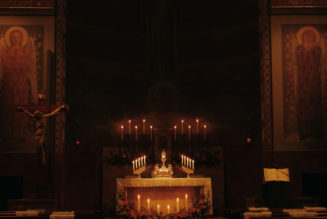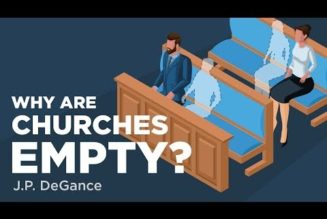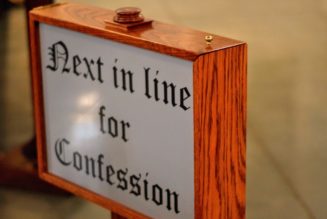
America has had no shortage of pessimistic critiques in recent years.
And with titles like Bad Religion: How We Became a Nation of Heretics and The Decadent Society: How We Became Victims of Our Own Success to his name, Ross Douthat has become something of a master of the genre.
But at a Sept. 6 talk at the University of Notre Dame, the conservative Catholic commentator and New York Times columnist sounded an uncharacteristically optimistic note regarding the United States’ prospects.
“There’s no better place to be for the rest of the 21st century than right here in America,” Douthat said to a full auditorium in Geddes Hall, answering in the affirmative the question posed by his talk’s title, “Is There Hope for America’s Future?”
However, there’s a catch: According to Douthat’s presentation, which was hosted by Notre Dame’s Center for Social Concerns, America will remain ascendant mostly because much of the rest of the world is headed to a dark place of demographic collapse, economic stagnation, and digitally aided despondency.
This dynamic, the 44-year old Douthat predicts, will set the stage for a resilient U.S. to play a more pivotal role on the global stage than even in the 20th century, when America defeated both Nazism and communism.
“America, more so than at any point, broadly, might actually be the last, best hope for the human race,” Douthat, who recently welcomed his fifth child into the world, told the audience, citing positive signs related to America’s economic vitality, levels of religious belief, and dynamism.
The Decadent Society, Revisited
Douthat’s assessment of American standing in the waning months of 2024 is a significant departure from the one he delivered in his early-2020 work, The Decadent Society.
In that book, published right before the COVID-19 pandemic began, the New Haven, Connecticut, resident made the case that America was “falling off,” trapped in a late-imperial malaise of repetition, stagnation and overabundance that had spawned everything from a fertility crisis to a never-ending series of derivative superhero-movie sequels.
The slew of unoriginal Marvel and DC Comic movies has continued, as has the fall of America’s birth rate. But other factors on the global stage and within American society have shifted enough over the past four years to the point where Douthat used his Notre Dame talk as a reassessment of his 2020 position.
“It’s not as simple as ‘decadence is over,’ but neither is it as simple as ‘decadence is just deepening everywhere, and we’re all doomed,’” said Douthat. “Instead, I think what’s happened is that global decadence has deepened, but the possibility for an American renaissance seems a bit more promising than it did five years ago.”
To illustrate his thesis, Douthat challenged the narrative that recent “geopolitical disturbances,” such as Russia’s invasion of Ukraine, Iran’s backing of the Hamas terrorist attacks in Israel, and China’s increasing saber-rattling vis-à-vis Taiwan, are indicative of so-called “successor” nations making their move in the face of inevitable American weakness.
Instead, he contended that these nations are acting aggressively now because their horizon for ascendancy is closing, with economic and demographic challenges — including birth rates even lower than America’s below-replacement-level-rate of 1.62 — set to weaken them relative to the U.S. within the next few decades.
Addressing China specifically, the Catholic columnist said that due in part to the one-child policy, “China is in serious danger of growing old before it grows fully rich.” He suggested that Chinese leadership’s awareness of this impending inversion is what’s fueling the East Asian nation’s current aggression.
“Again, not because China expects to have a ‘glide path’ to being the world’s dominant power in 2075, but precisely because they don’t,” said Douthat. “So they have strong incentive to act.”
The closing window of opportunity for America’s competitors has also coincided with signs of life back in the U.S.A., Douthat contended.
For instance, while Douthat argued in 2020 that the U.S. was drifting toward Western European-style stagnation and “museum culture,” with no creative dynamism or “confidence in its own future,” America has shown renewed indicators of entrepreneurial vigor in recent years. U.S. GDP has separated itself from Western Europe, while so-called “unicorn” startups that will likely define the next generation of global trade continue to be concentrated in America.
Additionally, Douthat noted that the decline of institutional religion in America — and the rise of the “none” religiously affiliated — has “seemed to slow” in recent years.
“It’s left America with a much more resilient religious population than you see in Western Europe or East Asia or other developed countries,” said Douthat, whose next book, Belief: Why Everyone Should Be Religious, is due out in February 2025.
In support of his overall assessment, Douthat noted that American liberal democracy — and not China’s Marxist-capitalism hybrid, Iranian theocracy or Putin-style pseudo-democratic authoritarianism — continues to be the most imitated and desired societal system in the world. That’s a far cry from the Cold War, when USSR communism posed a legitimate ideological threat to the American way of life.
Furthermore, while many American citizens may be increasingly pessimistic about the country’s future, the “American dream” continues to be an animating force for millions across the world, including middle-class, educated Chinese citizens, many of whom take drastic measures to attempt to enter the United States via the southern border.
Immigration in the opposite direction, Douthat wryly noted, doesn’t seem to be happening.
“We’re not living in a world where Americans are making their way to Manila in the Philippines and trying to take a boat and sneak past Hong Kong to the Chinese mainland,” he told the audience.
Even the high stakes, all-or-nothing feel of American politics this election season, Douthat said, is an indication that the U.S. is still the most significant force in the world.
Surviving the ‘Bottleneck’
Douthat suggested that America’s signs of resiliency are especially valuable at a time when the wider world may be entering what he described as a social Darwinian “bottleneck,” during which “certain societies and cultures and ways of being are just not likely to make it through the next 100 years.”
“Both individuals and social groups are going to lose themselves in the Lotus-eating temptations of prosperity, drugs, bread and circuses, gambling and virtual reality,” he said. “Whole societies are going to end up with modes of life that turn out to be unsustainable in this landscape.”
Douthat highlighted South Korea, where prosperity is high, but the birth rate is only 0.7 and digital saturation is extreme, as a paradigm of this kind of civilizational suicide. But he added that many other countries in Asia and Europe, like Spain, aren’t too far behind.
As a result, Douthat predicts that the remainder of the 21st century will be marked by people flocking to the few places on Earth that “still have dynamism, still have youth, and still have ambition,” with one country the clearly preferred destination: the United States.
“We are going to be the great outlier, the place that people want to get to, the place that has the best chance of escaping the pool of decadence, and the place where whatever human civilization exists on the other side of this bottleneck [is],” said Douthat, anticipating that immigration will be the defining American political issue “of the next 100 years.”
To be clear, Douthat still thinks America is beset by many of the same problems of decadence that threaten to undo the likes of South Korea and Western Europe.
For instance, he told those gathered, mostly Notre Dame faculty and students, that education should be about preparing the next generation “to be the kinds of people who survive the forces that are trying to make people inert,” like AI, Netflix and other aspects of the digital entertainment complex.
He even said that today’s universities — especially religious ones like Notre Dame —have to play a role in “forcing” students out of the digital environment so they can engage with more meaningful projects, and also more intentionally preparing them for aspects of adulthood that previous generations took for granted, like getting married and forming friendships.
“I think there’s more of an obligation than ever before for colleges to do that kind of thing,” Douthat said, also describing the college campus as “the best remaining place for real-world matchmaking.”
But even with all the challenges facing America — including lower rates of family formation, more addictive forms of digital immersion and, yes, the slog of superhero movies — the often-critical Douthat is confident that the United States is poised to play a vital role in the next chapter of human history.
“Whatever civilization is going to be built by the people who actually build the future, I think an incredibly important part of it is going to be built here.”
